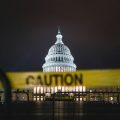Recently attorney Jeremy Tedesco, Senior Counsel and Senior Vice President of Corporate Engagement for Alliance Defending Freedom testified before a congressional committee about how big banks have targeted Family Council and other conservative organizations.
On March 6, the U.S. House of Representatives Judiciary Committee and the Select Subcommittee on the Weaponization of the Federal Government released a report indicating the federal government weaponized banks against conservatives.
The report shows that after the events of January 6, 2021, federal law enforcement officials from the Treasury Department’s Financial Crimes Enforcement Network (FinCEN) and the FBI initiated multiple discussions with financial institutions to discuss ways financial institutions could share customer information with federal law enforcement outside of normal legal processes.
The U.S. Treasury Department gave banks and other financial institutions guiding “typologies” — patterns that could be used to identify suspicious people or activities — including search terms and patterns like “TRUMP” and “MAGA”, and encouraged financial institutions to comb through transactions for terms like, “Bass Pro Shops,” “Cabela’s,” and “Dick’s Sporting Goods” when looking for “Homegrown Violent Extremism.”
The report also reveals the Treasury Department provided banks and financial institutions with an analysis that listed legitimate, conservative groups such as Alliance Defending Freedom, the American College of Pediatricians, American Family Association, Eagle Forum, Family Research Council, Liberty Counsel, National Organization for Marriage, and the Ruth Institute as “Hate Groups” alongside the KKK and the American Nazi Party.
On March 7attorney Jeremy Tedesco, Senior Counsel and Senior Vice President of Corporate Engagement for Alliance Defending Freedom, told the Select Subcommittee on the Weaponization of the Federal Government how big banks have targeted other conservative organizations like Family Council.
In his remarks, Mr. Tedesco said,
JP Morgan Chase de-banked the Arkansas Family Council for being “high risk” and never provided a credible reason for canceling the account of former U.S. Sen. Sam Brownback’s organization the National Committee for Religious Freedom. And Wells Fargo denied payment processing to the pro-life group The Ruth Institute. These are some of the many instances of viewpoint-based de-banking and are likely only the tip of the iceberg.
These stories highlight the systemic risk of political and religious bias that pervades the financial industry, particularly at the largest banks and payment processors. These institutions maintain reputational risk policies that allow them unfettered discretion to punish customers who have, in their view, problematic political or religious views. Many also have prohibitions on “hate” speech and “intolerance” that require the institution to make subjective and value-based judgments on a customer’s viewpoint. Both types of policies are vague and ambiguous, sweep in broad swaths of content, chill constitutionally protected speech, and erode economic freedom.
Worse, government regulators can all too easily wield their outsized power over financial institutions to pressure them to leverage these against disfavored views—all with virtually no public accountability. Financial institutions in turn can hide behind that same shield to discriminate without ever explaining it to the customer—regardless of whether the action was prompted by government pressure.
In 2021 Family Council’s credit card processor terminated our account after designating our organization as “high risk.”
At 10:29 AM on Wednesday, July 7, 2021, our office received a terse email from our credit card processor — a company owned by JPMorgan Chase — saying, “Unfortunately, we can no longer support your business. We wish you all the luck in the future, and hope that you find a processor that better fits your payment processing needs.”
Within sixty seconds, our account was terminated and and Family Council could no longer accept donations online. We never received any further explanation concerning our abrupt, unprofessional cancelation. All we can do is speculate that our conservative principles and our public policy work might have had something to do with the decision to close our account.
You can watch Jeremy Tedesco’s full congressional testimony below or read it here.



